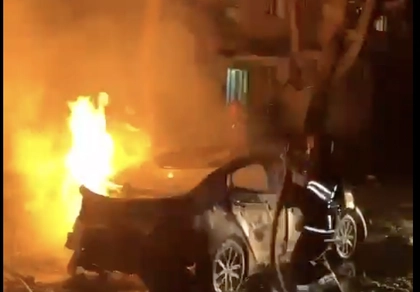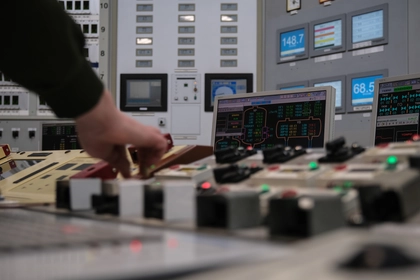Russian air attack hits residential building in Kharkiv
On the evening of Oct. 2, Russian forces attacked Kharkiv with guided aerial bombs. One of the guided bombs hit a residential building. As a result, ten people were wounded, among them a three-year-old child.
JOIN US ON TELEGRAM
Follow our coverage of the war on the @Kyivpost_official.
In the wake of the attack, Ukrainian President Volodymyr Zelensky appealed to Western leaders for more defense equipment.
“For such Russian strikes to stop, Ukraine must receive the required and, above all, sufficient support from the world, from partners. Every leader knows exactly what needs to be done. It is important to be decisive,” Zelensky wrote on social media.
Kharkiv, Saltivka—an ordinary residential building hit by a Russian bomb.
— Volodymyr Zelenskyy / Володимир Зеленський (@ZelenskyyUa) October 2, 2024
The rescue operation is ongoing, as they are searching for anyone who may have been affected. So far, 8 people are known to be injured. Everyone will be provided the necessary assistance.
For such Russian… pic.twitter.com/dnuyAHszCD
Olaf Scholz says Ukraine will get loan against frozen Russian assets
German Chancellor Olaf Scholz has guaranteed that Ukraine will receive a $50 billion loan at the expense of frozen Russian assets, adding that the support for Kyiv from its allies will not weaken.
Scholz spoke during a citizen's dialogue event in the German city of Schwerin, Ukrinform reported.
He called the $50 billion loan “a very deliberate promise of stability for Ukraine,” enabling the nation to retain the required support in the short term.
“This also sends a message to the Russian president that he should not expect that at some point the support [for Ukraine] will simply be gone, and that he will be able to devour the entire country,” the Chancellor said.

Ukraine Conducts Attack with Solely UGVs and FPV Drones, Destroying Russian Positions
Meanwhile, Steffen Hebestreit, a spokesperson for the federal government, commented on the reports about Sholz’s alleged readiness to have a phone call with Putin and guaranteed that the head of the government would do it once it is appropriate.
Jewish pilgrims celebrate Rosh Hashanah in Uman
Thousands of Jewish pilgrims, descended on the Ukrainian city of Uman this week for Rosh Hashanah, one of the most important holidays in the Jewish calendar, celebrated on Oct. 3 this year.
The city is home to the burial place of Hasidic Jewish leader Rabbi Nachman of Breslov (1772-1810) and has been a site of worship for over 200 years. But with Russia’s ongoing invasion and airlines canceling flights due to rising tensions in the Middle East, the journey has become even harder.
This year, more than 30,000 Orthodox Jewish pilgrims reportedly congregated in Uman.
Despite Russia's full scale invasion, 30,000 Hasidic Jewish pilgrims have descended upon the central Ukrainian city of Uman from all over the planet for the annual Rosh Hashana celebrations.
— KyivPost (@KyivPost) October 2, 2024
Celebrations begin today and last until October 4th. pic.twitter.com/FFUXKzYZ5h
A large number of police and ambulances were dispatched for the two-day holiday.
For the third year running, authorities had asked the pilgrims not to come, pointing out that their gatherings violate the war-time restrictions that Ukrainians have to follow.
This year 16 Israeli police officers arrived in Uman to help maintain order, police spokesperson Zoya Vovk told AFP.
“They help translate and convey information from the Ukrainian police to the pilgrims,” she said.
“This includes information about compliance with curfew rules, compliance with air raid siren rules, and other issues that need to be communicated to pilgrims,” she added.
In April last year, a Russian missile strike on an apartment block in the city killed 23 people.
You can also highlight the text and press Ctrl + Enter






